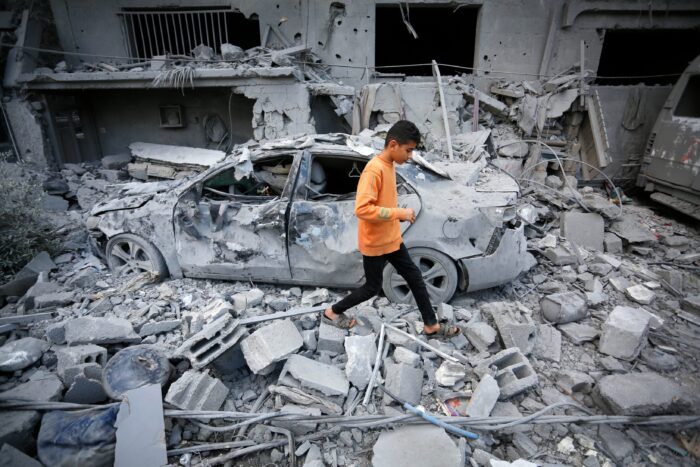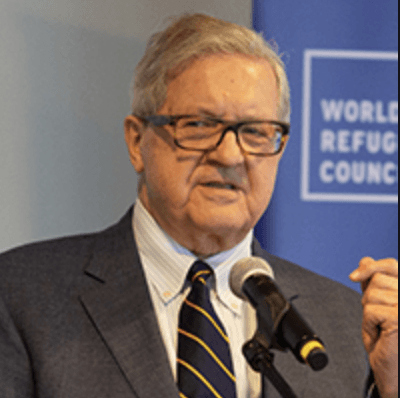By Lloyd Axworthy & Allan Rock
Lloyd Axworthy is Chair of the World Refugee & Migration Council and a former Canadian foreign minister. Allan Rock is a former minister of justice and attorney-general of Canada and has served as a UN Special Envoy on Children and Armed Conflict in Sri Lanka. This article was first published by The Globe and Mail. Photo: UNRWA
Susan Sontag, in her book Regarding the Pain of Others, wrote: “Being a spectator of calamities in another country is a quintessential modern experience.” It is also an experience with which we have all become increasingly familiar. The daily images of war and disaster spilling out of Israel, Gaza and the West Bank since Oct. 7 have stirred spectators’ emotions and invited them to choose sides: who are the just and the unjust? Where is the truth beyond the claims and counterclaims of spin doctors? Most impactful are the searing images of children in distress. The three-year-old Israeli girl on the hostage poster. The nine-year-old Palestinian boy pulled from the rubble.
Children, in all of their innocence, pay the heaviest price when adults fight for a cause, a religion, or a piece of geography. Spectators feel helpless, in their anguish and anger. It’s wrenching enough that Hamas holds children hostage. Now we are learning that Palestinian children have been held in Israeli prisons, many without being charged. Why?
The Middle East is only the most recent children’s calamity. Boko Haram has destroyed over a thousand schools in Nigeria. Russia has kidnapped tens of thousands of Ukrainian children and is brainwashing them to become President Vladimir Putin’s acolytes. Warlords in Sudan are willfully murdering women and children in the Darfur region in a ridiculous struggle for power. Myanmar’s soldiers have thrown Rohingya babies into fires. Refugee children seeking sanctuary on the Mediterranean or by crossing the Darien Gap in Central America are left to drown or starve in transit.
This is not happening because we lack laws and norms. Most of the atrocities are prohibited by international humanitarian law and international criminal law. And the UN Convention on the Rights of the Child requires adults to consider how their decisions affect children, and governments to accept responsibility for children’s protection and well-being – a commitment too often ignored.
It’s time for spectators to move from watching to acting, using the power of protest to compel adults to provide children with the protection they are promised. This month, the families of Israeli hostages filled the streets of Jerusalem, overcoming the obduracy of Prime Minister Benjamin Netanyahu and igniting political will in the White House to negotiate exchanges of prisoners and a temporary truce. That example should inspire additional efforts to protect the innocent from today’s brutality.
Spectators should also ask why existing laws and norms have not been enough to protect children. Last week, at a Massey College conference on atrocities committed against children in Ukraine, international law expert Wayne Jordash pointed out that few war crimes affecting children are prosecuted. Instead, we rely upon “soft law,” wherein the penalty is “naming and shaming” in the UN Secretary-General’s annual report on children and armed conflict. While useful, that mechanism lacks the deterrence afforded by criminal prosecution. It is also weakened by the tendency of the Secretary-General to leave off or drop states from the list if those states exert enough political pressure. The result? According to Mr. Jordash, it leaves major gaps in international criminal law, both from an accountability and a skills perspective. The absence of prosecutions for crimes against children has led to a lack of specialized units investigating and litigating these crimes, and a lack of standardized methods to investigate and bring such cases to trial.
To address those gaps, the International Criminal Court (ICC) and its prosecutor must focus more on crimes affecting children, including children in special categories: orphans, the disabled, and those separated from their families. By devoting the resources needed to investigate and prosecute those cases, we can close those gaps, enhance child protection, and make warlords think twice before targeting kids.
El Assembly of States Parties of the ICC will hold its annual meeting in New York from Dec. 4 to 14. Canada will be present. We should attend as more than spectators. We should do three things: seek and secure support for a resolution calling on the ICC to make the prosecution of crimes against children a priority; commit to a contribution to the ICC of both money and legal expertise to assist it in doing so; and convene a meeting of like-minded states to mobilize resources and political support in that effort.
Whatever else divides us, surely we can all agree that in war, targeting children is unacceptable. Bringing to account in a criminal court those who do so can help us better protect children and address the calamities we see in other countries that so trouble our collective conscience and break our hearts.


